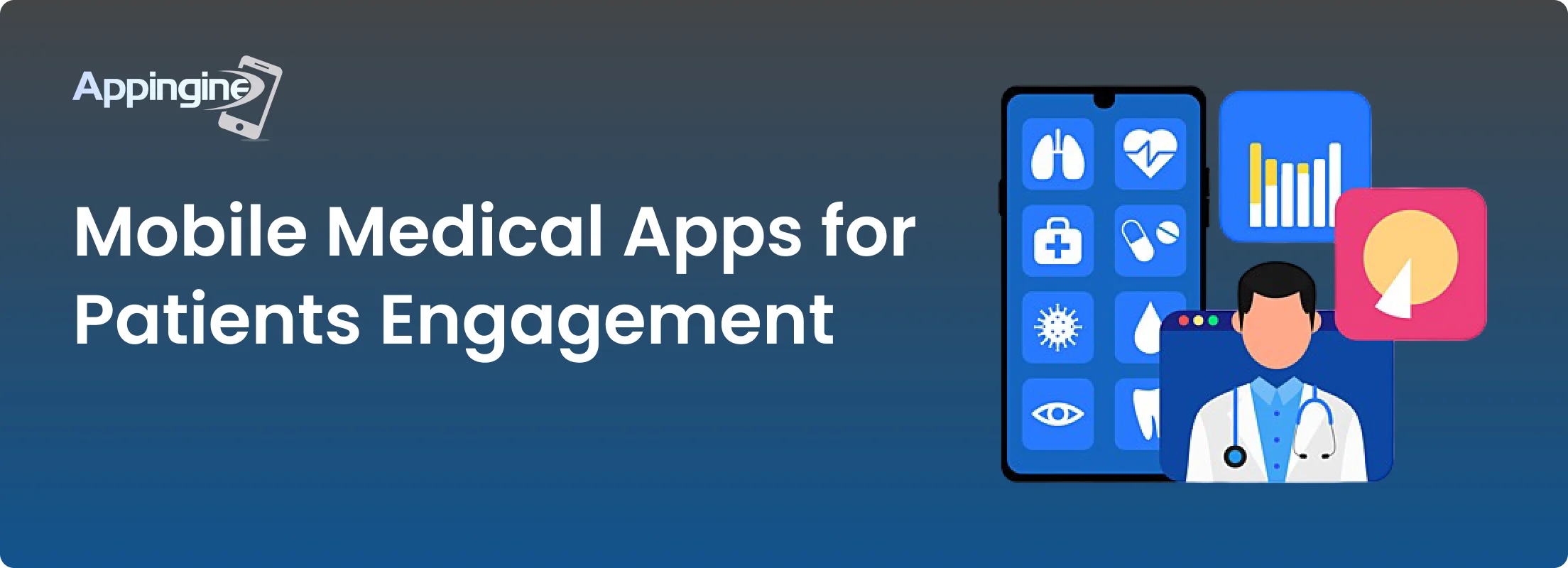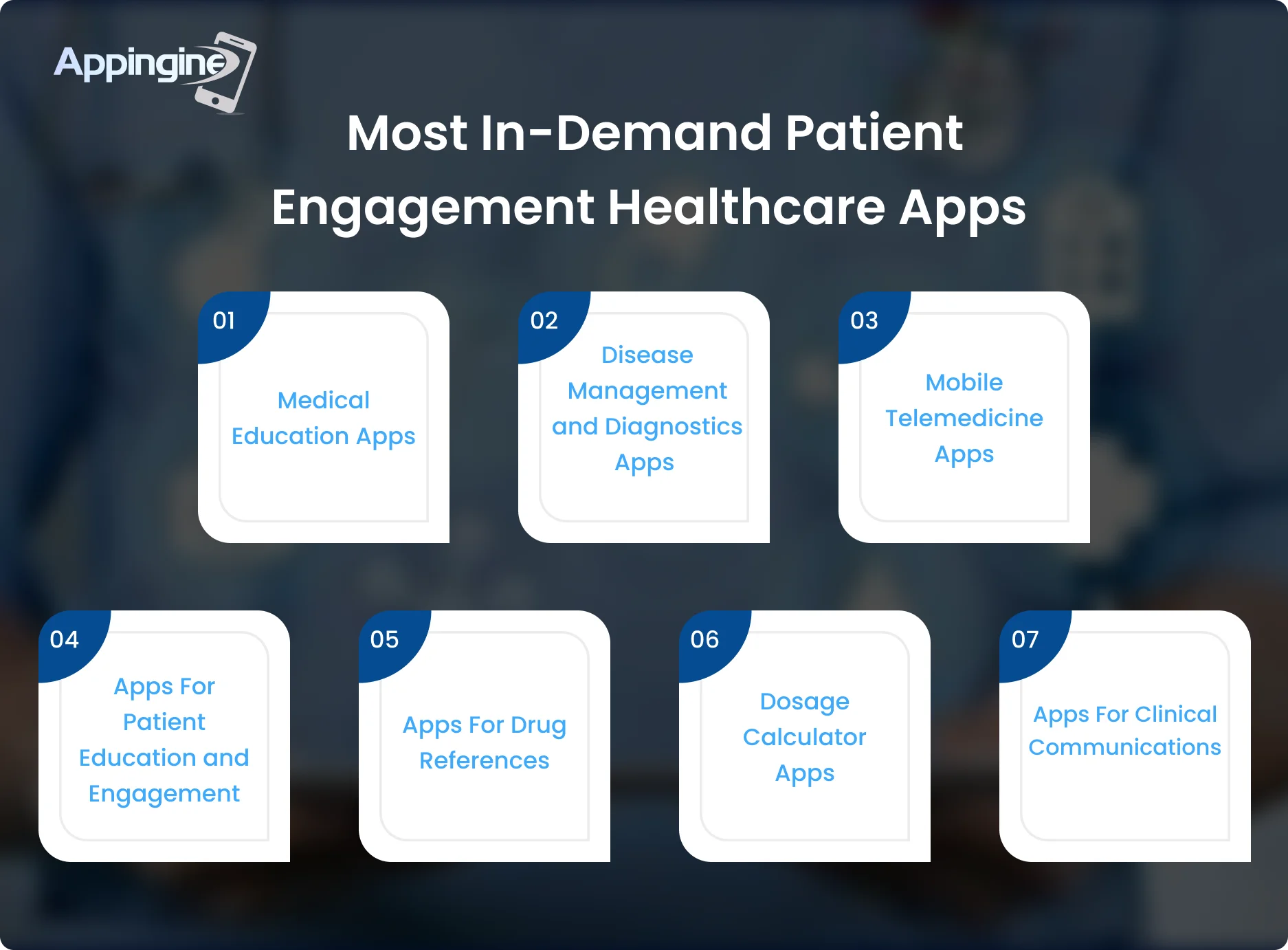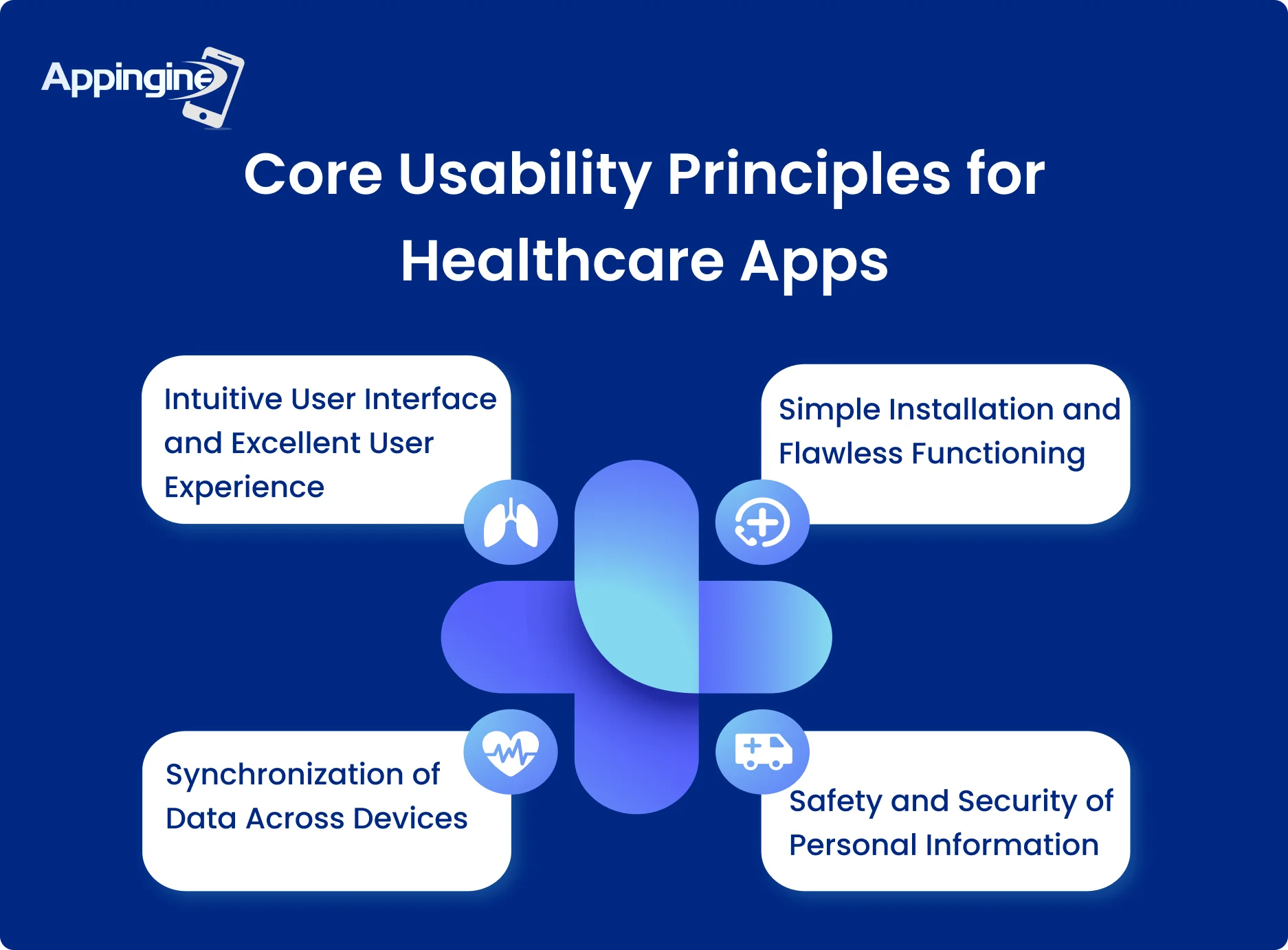Appingine
Let's Discuss Your Tech Solutions

Mobile apps have changed the way users are managing everything, from living their lives to interacting with the world. With the evolution of the digital world, these app solutions have taken over several industries, including healthcare at the top, education, restaurants, and many more. These applications are playing a vital role in enhancing user engagement and solving queries, appointment scheduling, online consultation, and more. Not only does the app perform these multiple tasks on mobile phones, but these can be taken advantage of on several devices such as tablets, web, etc.
Medical apps for patients are offering convenience and accessibility to their patients and other users, every time, everywhere. Along with the benefits, there come challenges, types, future trends, and more which are described in this article. So let’s jump right in!
Medical apps for patients are the relevant solution in the medical industry that serve the crucial functionalities and features such as appointment scheduling, medication reminder, doctors listing, and much more. Moreover, patients can easily have access to their past medical records, so they don’t have to lose them and look for their lost prescriptions in times of need. With the evolution of technologies and smartphones, the demand for healthcare apps is increasing and becoming a vital tool that not just engages customers but also easily connects them with their desired doctor while eliminating the communication gap.
What’s the best part about the healthcare app? Healthcare mobile apps for patients can easily be accessed from any location; all that is needed is to be downloaded on patients' mobile devices. Now, it has become more convenient for the patients to keep track of their health & medications on their own, which can be controlled at any time. By providing valuable information, resources, and advanced solutions that help in improving their well-being and medical conditions.
Not only for the patients, but apps for healthcare are beneficial for doctors & healthcare providers as well. From remote monitoring to allowing secure messaging between patients and healthcare providers, professionals take full advantage of the digital healthcare apps.
While keeping every disease and treatment in mind, online medical applications are the ultimate solution that promotes preventive care and wellness initiatives. Anyone can have the benefits of health apps and their features, such as fitness tracking, mental healthcare resources, nutrition monitoring, medication reminder, and more to change their choices for an enhanced lifestyle.
Hire app developers at Appingine and turn your mobile patient engagement vision into a secure mobile app. Contact us right away!
Contact UsEver heard of the phrase “health is wealth”, and taking care of every smallest thing that is indirectly connected with your health, whether it is mentally, emotionally, or physically. Digital healthcare apps can be categorized according to various functionalities. Some of these healthcare app types for patients are listed below
These mobile apps for healthcare ensure that patients are served effectively.

Mobile health apps for patient engagement enhance and support educational procedures as well. These apps provide permanent access to current medical content, including prescription guidelines, diagnostics, and more, while saving time compared to lengthy instructional sessions.
Symptom checker apps for healthcare are widely used, allowing healthcare providers to stay connected with patients in real time, monitor medication conditions, review lab results, assess current health, and provide ongoing health coaching. For example, a well-known app helps doctors detect skin cancer in its early stages by offering instant diagnostic results.
Another valuable feature in mobile apps for healthcare is integrated video service technology that enables healthcare providers to monitor their patients remotely and allows doctors to provide medical assistance to their patients who may have limited access to in-person care due to some circumstances. For example, another well-known app allows patients to make video calls and connect with their physicians from anywhere.
Online medical applications are specially designed for patients that include educational content along with the treatment options of their diseases or any health conditions, while suggesting some prevention methods and more. This application increases customer engagement while improving their experiences and providing higher satisfaction. These apps for healthcare eliminate a certain gap between the healthcare providers and patients with others facing similar symptoms or illnesses, while allowing them to share experiences and find support.
These medical apps for healthcare professionals give physicians access to health information regarding medications, pharmacology, doses, indications, interactions, contraindications, expenses, and more.
These healthcare mobile apps for patients can determine dosage or recommend dosage depending on a variety of complicated formulae and unique medical conditions.
With virtual features like voice calling, video conferences, messaging, and more, this kind of hospital communication app streamlines contacts between medical professionals and enables prompt answers.
From telemedicine to medication tracking, your healthcare app can do it all. With HIPAA-compliance, our apps for healthcare are built with our expert development team.
Build Your First Healthcare AppThe revolution of mobile health apps for patients allows users to schedule appointments, speak directly to their desired doctor, have access to health records, and so on efficiently. These applications allow the patients to take care of themselves and take full control of everything regarding their health. With the help of these digital healthcare apps, users' crucial data and information are kept safe and confidential. Here are a few more benefits that are listed below along with their challenges.
Wondering what best features or functionalities apps for healthcare professionals and patients must have? Below is a comprehensive list:

Innovations in digital patient engagement apps incorporated with advanced technologies take clinical efficiency to the next level while improving diagnostic accuracy and help pharmaceutical brands to stand out in the competitive market. A healthcare app development company covers UI/UX design, front-end and back-end development, app creation, quality assurance, and app launch as well as maintenance in future.
For the best healthcare app experience, consider partnering with app development companies specializing in mobile app development, such as Appingine. With the utilization of advanced technologies, our health app developers are experienced enough to serve clients with top-notch services, including strategic planning tailored to each project.
Taking care of yourself and your family has become easier with the help of apps for healthcare. It is crucial to understand the basic difference between "telehealth" and “telemedicine”. Well, telemedicine applications provide online services for healthcare, whereas on the other hand, for clinical and non-clinical purposes, telemedicine applications are utilized to eliminate the communication gap between the users and healthcare providers.
Without following the traditional formula, the telehealth application allows patients to take advantage of these platforms remotely. These applications not only serve the clinical services, but they are also used to supplement the medical care that patients are receiving from the primary healthcare providers.
It can be a challenging task to manage the medical record for yourself as well as a family member when you have a busy schedule. With the help of personal mobile apps for patients, it has become easier to save records from the past. These applications not just manage but also act as a virtual assistant that sends reminders for your next appointment, shops for the consultation at the best prices, and encourages patients to have control over their health and nutrition. And, the best part about online medical applications is that various apps such as patient tracking, patient engagement, hospital communication, and etc, are available in the app market for free.
Moreover, for either patients or healthcare providers, it is important for every user to make sure that the mobile app for healthcare they are using is compliant with HIPAA and is secure. Why? Because, medical records contain important information that should not be accessible or shared with anyone. While downloading the application, it is essential to go through the security compliances and regulations that keep the app and users' sensitive data and information safe and secure.
Knowing about the application for medicine and healthcare is not enough, ensure to have a know-how about the future trends that can bring a huge change in the healthcare industry and its app market.
Whether it’s mental health support or chronic care management, we’ve got the expertise to deliver whatever you are looking for. Get in touch and take the first step toward innovation.
Hire Healthcare App ExpertsFor better recommendations and algorithms, integrating Artificial Intelligence in the mental health mobile app to develop insights based on the user data. Not only this, it provides personalized mindfulness solutions and cognitive behavioral therapy for its patients as well.
It also helps a lot in the telehealth sector, by analyzing the medical data, treatment recommendations made by professionals, and more. Artificial Intelligence uses a vast dataset to predict the treatment outcome, identify treatment patterns and also offers healthcare advice. By incorporating these technologies in the mobile health apps helps in boosting diagnostics, patients care and improves overall healthcare efficiency.
Adding features and elements that are interactive keeps the user engaged and captivated. Through this, conversational support is provided to them so that they are moving in the right direction. For better emotional health and to keep track of their health, wearable integrations are done which allows users to keep themselves updated all day long. Also, by adding gamification in the application also helps heal patients with mental illness very fast and makes their journey rewarding.
Mental and medical healthcare applications collect the sensitive data of the users, and for that EHR integration is essential to keep the information secure and confidential. It will help the user to make informed decisions according to their analyzed data and insights. Furthermore, the actual idea of EHR integration is to make sure that the data is collected using industry-specific policies and regulations.
Healthcare apps have revolutionized patient engagement by bringing healthcare closer to users, anytime and anywhere. As learnt throughout this article, the variety of these apps caters to a wide spectrum of needs while enhancing communication between patients and providers. By collaborating with our expert app developers,who believe in providing the best healthcare app development services, organizations and doctors can build secure mobile apps that not only meet today’s market demands but also anticipate tomorrow’s needs.